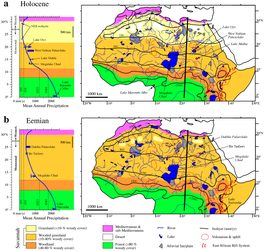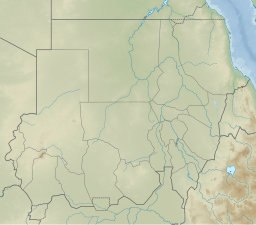| Lake Ptolemy | |
|---|---|
| West Nubian Paleolake, Northern Darfur Megalake | |
 Map of northern Africa with Lake Ptolemy indicated as West Nubian Paleolake | |
| Location | Darfur, Sudan |
| Coordinates | 19°30′N 26°00′E / 19.5°N 26°E |
| Type | Former lake Holocene lake 9,100–2,400 BP |
| Etymology | Ptolemy |
| Part of | Sahara |
| Primary inflows | ? |
| River sources | ? |
| Primary outflows | ? |
| Basin countries | Sudan |
| Surface area | 8,133–11,230 km2 (3,140–4,336 sq mi) |
| Max. depth | 15 m (49 ft) |
| Water volume | 372–547 km3 (89–131 cu mi) |
| Salinity | ? |
| Surface elevation | 550–555 m (1,804–1,821 ft) |
| Max. temperature | ? |
| Min. temperature | ? |
| Frozen | Never |
| Islands | ? |
Lake Ptolemy is a former lake in Sudan. This lake formed during the Holocene in the Darfur region, during a time when the monsoon over Africa was stronger. The existence of the lake is dated between about 9,100–2,400 years before present. This lake could have reached a surface area of 30,750 square kilometres (11,870 sq mi), larger than present-day Lake Erie, although estimates of its size vary and it might have been much smaller. The shorelines in some places, insofar as they are recognizable, feature riparian landscapes and reeds. The lake was a freshwater lake replenished by groundwater and runoff from neighbouring mountains and might itself have been the source for the Nubian Sandstone Aquifer System. The lake featured a diverse ecosystem with a number of species, and possibly facilitated the spread of species between the Nile and Lake Chad.
